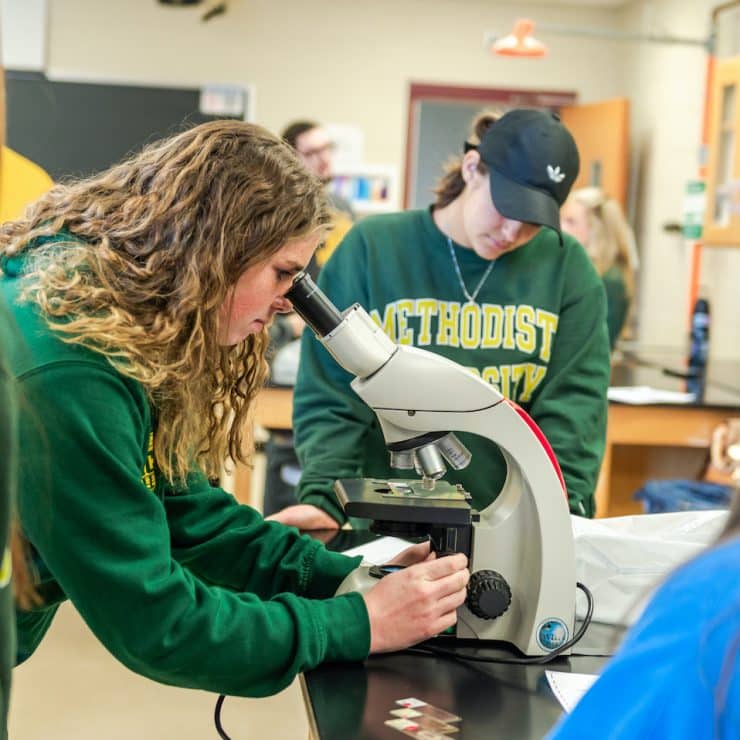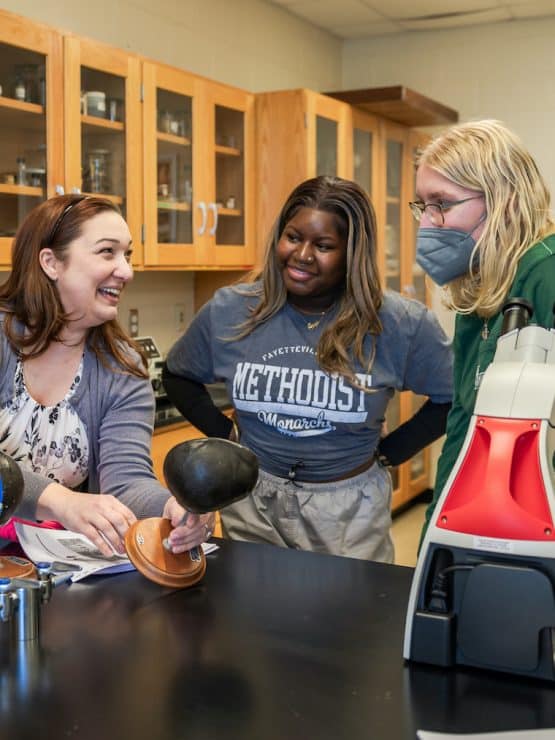
Biology
The Biology Department faculty consists of seven biologists whose areas of expertise encompass botany, cellular and molecular biology, developmental biology, ecology, evolutionary biology, human biology, microbiology and zoology. The department is housed in the Hendricks Science Complex and includes faculty offices, eight teaching laboratories with modern microscopes, various laboratory stock rooms, two lecture halls, a faculty research laboratory, a student lounge, and a greenhouse. All lecture halls and laboratories are equipped with digital projectors and sound systems. Approximately 180 students are enrolled as Biology majors during any given semester, making the Biology Department one of the largest academic departments on campus.
Common Career Paths
Biology degrees are extensive so careers for Biology graduates are equally as wide-ranging. According to TopUniversities.com, some of the careers you can pursue with a Biology degree include:
- Research scientist
- Pharmacologist
- Biologist
- Ecologist
- Nature conservation officer
- Biotechnologist
- Forensic scientist
- Government agency roles
- Science writer
- Teacher
Common Salary Ranges for Graduates
Nationwide, the average salary for Biology graduates in the Fayetteville area reaches the $62,000 threshold with some graduates reaching as high as $117,000.
Average Tuition Cost
The average cost for an incoming residential freshman to attend MU is less than $18,000 – similar to the cost of attending one of the big-box public schools, but with the enhanced value of a highly-regarded private school with a 12:1 student-to-faculty ratio.
While tuition varies, depending on a student’s financial aid package, it’s important to know that the average financial award for an incoming residential freshman at MU is more than $34,000.
Financial Aid & Scholarships
More than 97% of MU students receive some form of financial aid, with the University offering more than $24 million annually to students for scholarships. If a student is active military, family of active military, or a veteran, they may also qualify for MU’s military education benefits.
Optional Concentrations for Biology Majors
Biology majors may choose an optional concentration in either Pre-Medicine or Pre-Veterinary Medicine. Follow the links below for information and curriculum requirements on these concentrations.
Interested in Methodist University’s Biology program?
If you have questions, see the FAQ below or reach out to Dr. Lauren Klabonski using the contact info at the bottom of the page. If you’re ready to apply today, click the button below!
Mission
The Methodist University Biology Department strives to provide a supportive, rigorous and hands on learning environment for students. Our undergraduate curriculum is designed to give students the flexibility to train for careers in the health sciences, academic research laboratories, the private sector, and governmental agencies immediately following their undergraduate program as well as to prepare students for entry into traditional life science and professional graduate programs. The Department views student research as a core component of the undergraduate experience in the life sciences and the faculty endeavor to include students in their research and to encourage students to take up their own research projects whenever possible.
Goals
- Within three months of their graduation, fifty percent of the graduates of the Methodist University Biology Department will be admitted to graduate or professional school, or will be employed in a field related to their major.
- The average score of Methodist University seniors on the ETS major field examination in biology will be above the national mean.
- Biology graduates will be able to assimilate scientific information and to demonstrate their comprehension of it in preparation of oral and written presentations.
- Students taking either Science 1420 (Biological Science) or Biology 1530 (Fundamentals of Biology: Introduction to Cellular Biology) as part of the general university core will become familiar with the basic vocabulary and concepts of biology. Those taking Biology 1530 will also become prepared for future study in this area.
Frequently Asked Questions
Biology degrees are extensive so careers for Biology graduates are equally as wide-ranging. According to TopUniversities.com, some of the careers you can pursue with a Biology degree include:
- Research scientist
- Pharmacologist
- Biologist
- Ecologist
- Nature conservation officer
- Biotechnologist
- Forensic scientist
- Government agency roles
- Science writer
- Teacher
Biology is a fast-growing field with a wide range of high paying jobs. The average expected job growth for all occupations in the U.S. is 3.7% with some of the highest-paying jobs coming to those with Biology degrees.
At Methodist University, the biology degree offers four different concentrations including general, cell and molecular, health care, and integrative. Each concentration consists of 82-83 semester hours with varying required courses and electives. To know what specific classes are required for a specific concentration within the Biology program, visit any of the following pages: Cell & Molecular Biology, Health Care Biology, and Integrative Biology.
Contact
Lauren Klabonski, Ph.D.

